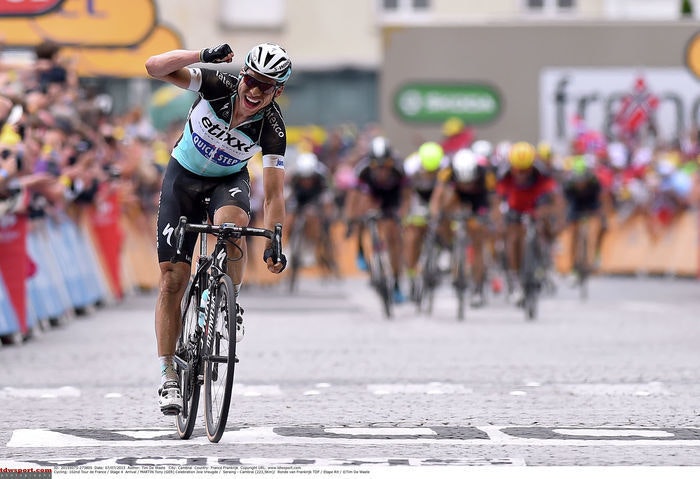2075 miles over 21 days of intense racing makes the Tour de France the most physically demanding sporting event in the world. To put that into perspective, riders will expend 9,000 calories a day for three weeks, or the equivalent of 27 cheeseburgers every single day!
So how do riders manage those extreme nutritional demands? And what lessons can you take from them to improve your own cycling?
Number crunching
Let's consider data around what the average Grand Tour cyclist would need to be consuming per day on Tour. This image was taken from a research study tracking energy intake and expenditure throughout le Tour…
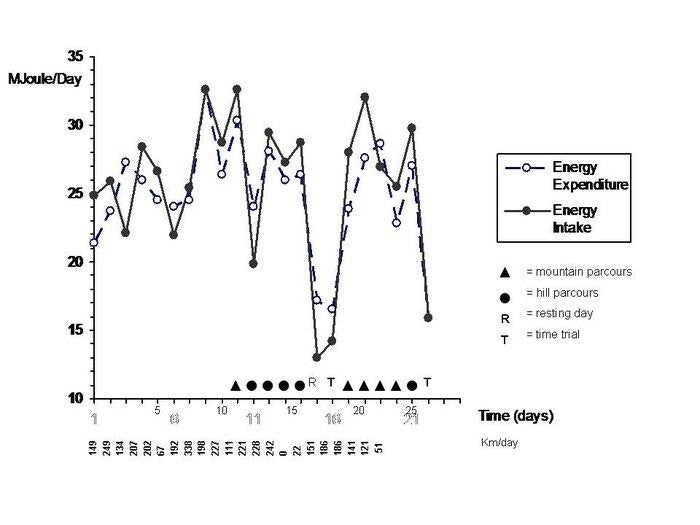
What is amazing is the athletes' ability to mirror energy intake against expenditure, with a large part of daily energy intake actually consumed on the bike. Given the riders come into the Tour on weight, achieving daily energy balance is exactly what is necessary.
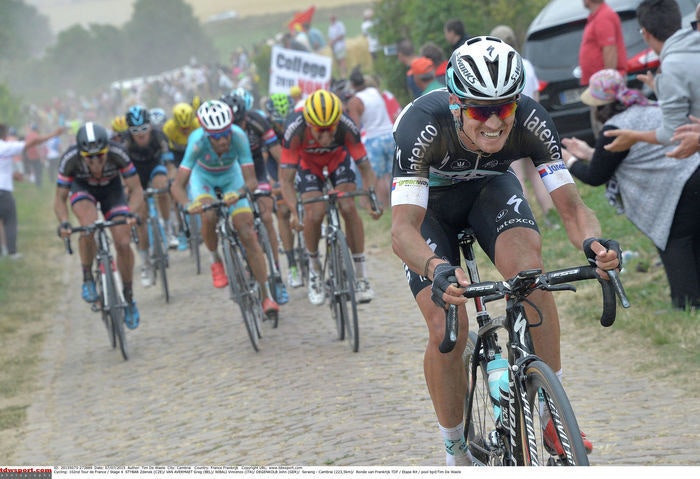
Some of the biggest challenges facing an endurance cyclist and how to address them via nutrition
Three big challenges a cyclist faces during racing include…
Challenge #1 - Depleting energy reserves and thus hitting the wall during a race To overcome this a cyclist needs to ensure they allocate sufficient fuel foods during a ride. This is especially important for longer days in the saddle where depletion of energy reserves is inevitable. As a general guide, 60g of carbs an hour will cover the needs of most recreational cyclists but as the duration of a ride increases, so too will the need for additional fueling. Current guidance suggests up to 90g carbs may be needed per hour.
The list below provides ideas on different foods/drinks that can be used on the bike. Each serve provides 20g carbs…
• 1 banana
• 1 Vegemite sandwich
• 400 ml Etixx Isotonic
• Etixx Energy Gel – If you want a caffeine hit, try the caffeinated gel
• Etixx Energy bar
• 300 ml Cola
Sports drinks like Etixx Isotonic are particularly valuable as they simultaneously meet fluid, carbohydrate & electrolyte needs.
Challenge #2 - Becoming progressively dehydrated to an extent where this will limit performance The main reason a cyclist becomes dehydrated on the bike is simply a mismatch between fluid intake and sweat losses. It is not because of a lack of electrolytes. Thus remaining sensitive to thirst and drinking when you are thirsty may be all it takes. To assist in being more directed with fluid intake after a ride, consider weighing yourself before and after a ride. Whatever the weight loss, consume 1.5 times this in fluid over the next 2-3 hrs. Drinking with meals can really help as this approach takes advantage of the salts naturally found in food to assist with better fluid retention. Maintaining this strategy throughout the day can help ensure you start a session well hydrated also.
Challenge #3 - Failing to adequately recover from a session to the next or one day of racing to the next, and thus accumulating fatigue This may merely reflect an inability to match daily energy intake to energy needs. Load on the bike will dictate energy expenditure and thus daily energy needs. When you have bigger loads on the bike, your energy intake should reflect this. Similarly, when training loads back off, so should energy intake. Sounds simple, doesn’t it? Unfortunately for many athletes their appetite doesn’t provide a great insight into energy needs, especially when energy expenditure varies markedly from on day to the next. There is also clear evidence of the value of dietary protein in being able to enhance recovery. Typically this doesn’t mean increasing your daily protein intake, rather just allocating it more evenly throughout the day. Aim to include a small serve of protein rich food at each meal and snack throughout the day. This could be including an egg based breakfast, yogurt at morning tea and some lean meat on sandwiches at lunch. During the afternoon add some cheese to crackers and include just a palm size serve of lean meat, poultry or seafood at dinner.
How a cyclist's eating pattern would likely look in the days leading up to, during and post Tour
The infographic below comes from Asker Jeuekendrup, an esteemed researcher and Ironman triathlete. It provides a novel way of describing daily energy intake of cyclists in the Tour, expressed in cheeseburgers…
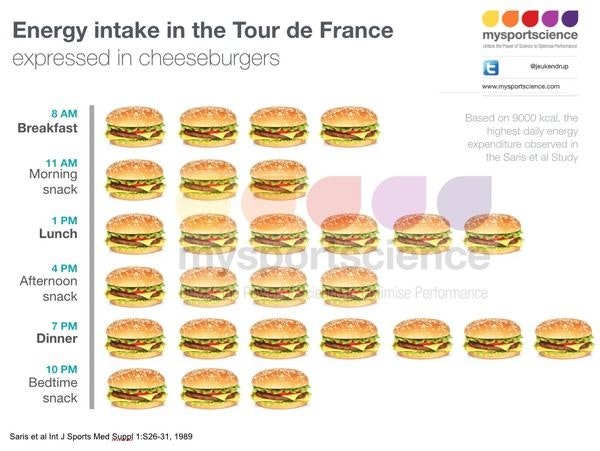
Find our how Hollee Simons established a nutrition plan to reduce her weight and optimises her cycling
Some of the biggest riding/nutrition misnomers
I believe far too many riders don’t pay sufficient attention to nutrition intake on the bike. If you know what your session is scheduled to be, this can be used to decide on what fuel needs to be consumed on the bike. Far too many riders under consume on the bike and over-consume off the bike. This has a major impact on the work you are capable of doing on the bike. Do more work on the equates to better training adaptations.
Nutritional needs that are specific to an endurance cyclist
Dietary intake has an impact on such a wide range of areas for athletes, with the importance of these varying based on the athletes current training program and goals. For example, during early pre-season a cyclist may be focused on building their aerobic base while reducing body fat in an effort to enhance power to weight ratio. As the season approaches when more intense training is undertaken the cyclist will want to use their daily food intake to help optimise fuelling and recovery. They may also want to trial during race strategies in training to assist in fine tuning interventions they will want to use during racing. Throughout the year there needs to be recognition of the impact diet can play on overall health, including immune function & general well-being. Far too many athletes fail to recognise the breadth of impact diet has.
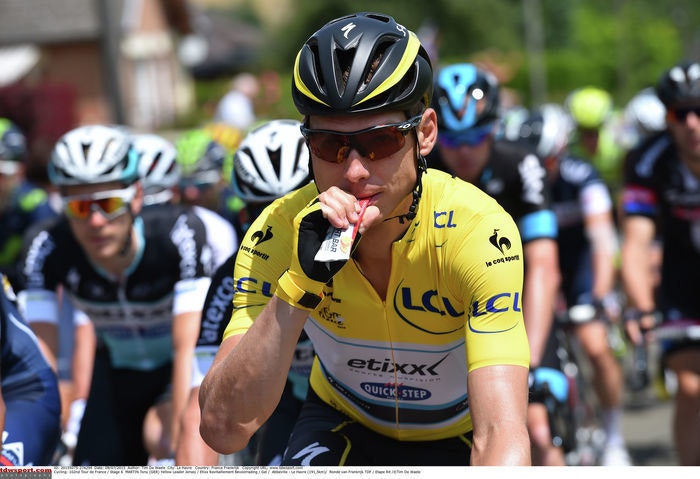
Products to help you carbo load for extended and consecutive periods on the bike
The cyclists will use a combination of whole foods and sports foods, the later including products like Etixx Isotonic, Etixx Energy Gels and Etixx Energy Bars. Given the duration of racing and thus the potential for flavor fatigue, there is a trend for athletes to maintain an intake of readily accessible, less perishable carb rich foods on the bike as well as the sports foods. It’s a case of starting fueling early on the bike and being consistent throughout the day. For those that really struggle, high carb sports supplements are available that can be used to further fortify your energy and carb intake. Etixx Energy Load is an example of such a product. However given these supplements provide additional fuel but little else, it’s important their intake is used to supplement your meal plan, not substitute for other nutrient rich foods.
The strangest nutritional practice/belief I've encountered when working with endurance athletes
Is the perception that there isn’t a need to take anything before a session. Granted if you are just rolling the legs over for a 60 to 90 min ride, there’s little need for taking on additional fuel but it’s been 8-10 hrs since you last ate so for any more intense or longer session, setting the alarm 15 minutes earlier so you can take a pre-training snack will pay dividends, increasing fuel availability throughout the session.
Background
*The Etixx Academy, which is led by Dr Gary Slater, has been established to assist younger athletes (between 15 – 20 years) achieve their health and performance goals. Gary is a sports performance focused dietitian and sports physiologist who has been working in elite sport since 1996. He has a passion for helping athletes achieve their sporting ambitions, including those aspiring for Commonwealth and Olympic Games success. Gary currently splits his time between hands on athlete servicing and researching the impact of diet on sports performance. He currently consults to a large number of athletes, including individual athletes with Olympic aspirations as well as professional team sport athletes. Dr Gary Slater shares his time out of the surf between coordinating a Master’s Degree in Sports Nutrition at the University of the Sunshine Coast and his role at National Performance Nutrition Coordinator for the Australian Rugby Union. *
Keep up with our reviews, news, interviews and more - like us on Facie or subscribe to our email
